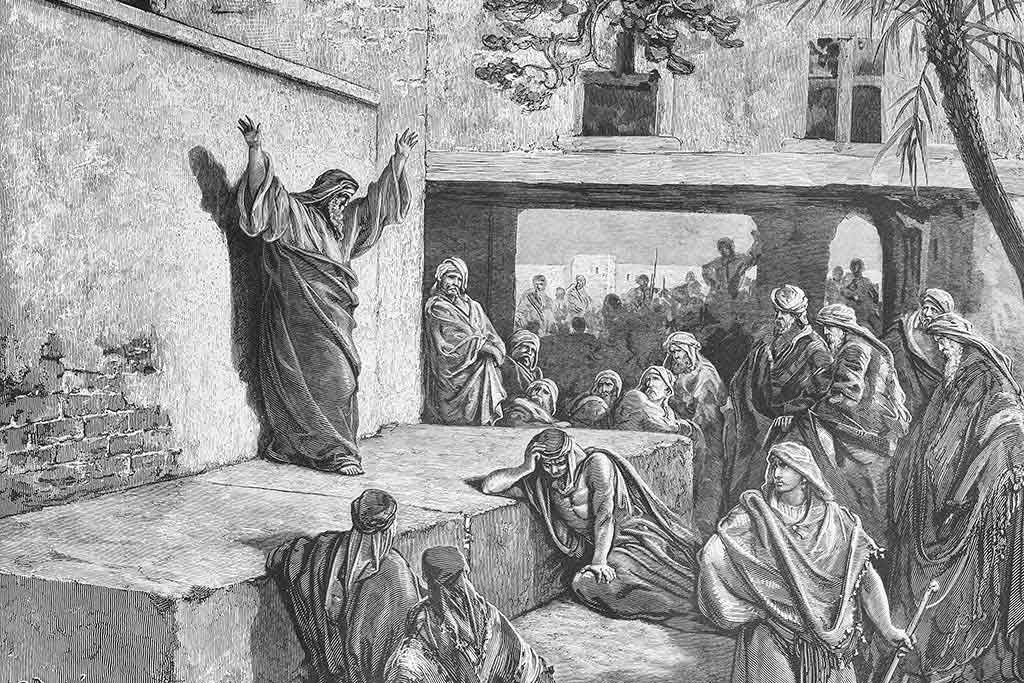
The Bible Is for Our Time, But Not About Our Time
The Bible is for us. It is the principal source for how to believe and behave as disciples of Jesus Christ. The Bible exists for us to have a God-centered view of creation, to understand God’s providence in history, to hear God’s promises, to know God’s words of warning and encouragement, to have the words of Jesus, to hear the apostles’ testimony about Jesus, and to look ahead to the kingdom in all its future fullness. The private and public reading of the Bible is for us in the sense that it is for our training, our edification, our transformation, and our encouragement. The Bible is for us since the Bible enables God to speak to people across the tide of history, through our manifold cultures and languages, and in a way that truly transcends human differences. Whether you are a second-century Christian in Rome, a fifth-century Arab Christian in the city of Tikrit, or a twenty-first-century believer in Zimbabwe, the Bible is God’s word for you, for them, and for us today. The Bible is for us, yesterday, today, and until the end of the age.
However, even though the Bible is for us, it was not written to us, nor was it written about us. When we read the Bible, we are entering into a historically and culturally distant world and we must “mind the gap” as they say on the London Tube. In the rush to make the Bible instantaneously relevant, we can inadvertently misuse it by not recognizing the specific situation of the authors and lazily pick up something that seems handy to us on a first read. In terms of Bible study, this is like browsing Wikipedia rather than spending a few hours in your local library. Reading Scripture for quick practical application, and ignoring the social, historical, and cultural gap, is like looking for instant gratification without the hard labor of study.
The problem is that if we disrespect the historical distance, we will potentially distort the Bible’s proper interpretation. Accordingly, it is essential to ask what Isaiah 53 meant for the Judean exiles in sixth-century Babylon before we ask how it applies to twenty-first-century Baltimore, Brisbane, or Bogotá. I know this is going to sound strange, but in order to make the Bible meaningful, relevant, and applicable, the Bible first must be defamiliarized and dislocated from our own time.¹ In other words, we have to grasp how strange the biblical world is before we can try to make it familiar to our own audiences, or to say that again, we have to realize how different the Bible is from our own time before we can allow it to speak to our own contemporary situation. Otherwise, we will end up with a superficial reading of the Bible, or worse, we will end up reading our own context and times into the Bible.
There is a real danger that we become overly familiar with the Bible in the sense that we read our own experiences into it. We have to remember that the biblical world was rather unlike our place and time. People who work in biblical translation deal with this problem all the time. I mean, just how much of the Bible can you translate into a culture, and how much do you have to leave untranslated? When Bible translators first came to Papua New Guinea, they had a problem. How do you say that Jesus is the “Lamb of God who takes away the sins of the world” to people who have never seen a lamb and who have no idea what a lamb looks like or how lambs were used for sacrifices and meat in the Middle East? Now, in Papua New Guinea they do have pigs, which were symbols of prosperity and wealth, and pigs were used in indigenous religious practices. So could you say that “Jesus is the Pig of God who takes away the sins of the world”? Perhaps, but probably not a good idea given Old Testament prohibitions on consuming pork, which would create confusion. So probably best to leave it as “Lamb,” and then when someone asks, “What is a lamb?” go ahead and explain it to them. But I hope you get the point. Some things need to be left untranslated, kept different, and made foreign in order to properly understand them.
The problem is that in the psychology of reading we cannot help but associate the familiar with the unfamiliar, in the hope of understanding better. We always associate the words, images, and metaphors in a text with our own experience of those same words, images, and metaphors. While the commonality of human experience is what makes translation and reading possible, there is the danger of projecting your own experience of something, whether lambs or temples, into the text you are reading. The problem is that things we take for granted, think of as self-evident, or plainly assume, were often quite different to ancient peoples. When Isaiah or Luke mentions X, we might assume that X meant to them the same thing it means to us. But this is frequently not the case. Often words, concepts, and symbols had different meanings in the ancient world than in our modern world. Let me demonstrate that to you by showing how the words “religion,” “gift,” and “hospitality” meant very different things in the ancient world than what they do now.
When Religion Is Not Actually Religious
Those of us living in the modern West tend to think of “religion” as the sphere of the sacred, to do with beliefs about God, with ethical obligations commanded by God, and connected to virtues like charity. Moreover, religion for us is distinct from the secular world with its neutral public places and institutions like government and education. However, in the ancient world, “religion” was not about beliefs and ethics; rather, it was about duties to the gods largely in terms of rituals. The ancient world also had no secularism with the separation of church and state; instead, things like religion, government, economics, business, citizenship, ethnicity, and military commands were all bound tightly together. Accordingly, when Paul commends the Athenians for being “religious,” they are not thinking that Paul likes their theology and ethics, which are separate from their politics; no, they are thinking of Paul as affirming the way that they perform their duties to honor the gods in sacrifices, prayers, and other rituals (Acts 17:22).²
When Gift-Giving Is Not Free
We tend to associate gift-giving with entirely gratuitous generosity with the expectation of nothing in return, yet that was not ordinarily what gift-giving meant in the ancient world. In the ancient world, gifts usually had some reciprocal expectation, strings attached, some indebtedness making it incumbent upon the recipient to return some favor or service to the gift-giver. All gifts had an implicit quid pro quo, even if there was a measure of generosity shown by one side. One thing that is striking about the apostle Paul’s theology of grace is that his notion of the divine gift of salvation is not about reciprocity but incongruity: God bestows his gift of grace in a way that people can never fully pay him back (see Romans 5:15–17; 6:23). Knowing a little bit about ancient gift-giving helps show us how Paul’s theology of grace and divine gifts stands out.³
When Hospitality Is Way Beyond Friends
People today tend to think of hospitality as something they do for friends and relatives—having them over for a meal or taking them out for dinner. But in the ancient world, hospitality is what one did for strangers, people they did not know or did not know if they could fully trust (see Romans 12:13; 1 Timothy 5:10; Hebrews 13:2; 3 John 8)!⁴
Moving from Familiarity, to Strangeness, to Application
So if we think that the ancient world divided religion from politics or thought of religion in terms of beliefs and ethics, then we will misunderstand references to “religion” in places like the book of Acts (Acts 17:22; 25:19; 26:5). Or if we read our own idea of “gift” back into Romans 5:15–17 and 6:23, we will likely miss something or misunderstand the radical nature of Paul’s point about how lavish God’s grace is toward us. Likewise, if we think “hospitality” just means hanging out with our nice middle-class church friends, we will not actually be obeying the command “Do not forget to show hospitality to strangers” (Hebrews 13:2). We will not be engaging in biblical hospitality which requires looking after the immigrant, the stranger, and the refugee in our midst.
Therefore, in order to understand the Bible, you have to “defamiliarize” or “other” the Bible. To be clear, I do not mean treating the Bible as a historical relic with little or no relevance for our own day. I am not suggesting we study the historical context of the Bible solely for the purpose of creating a museum of funny old words and strange ideas to be analyzed for curiosity’s sake. Rather, I mean studying the Bible afresh, recognizing its distinctive location and purpose, grasping its situatedness and its own back-then-ness. Once the Bible seems strange to us, then we can reread it anew, on its own terms, without projecting ourselves or our own culture into it. Thereafter, we are enabled and encouraged to find new, exciting, and challenging ways to make it relevant for us.
Therefore, the aim is to highlight the importance of knowing historical background, entering the world and culture of antiquity, and the big payoffs you get in understanding and applying the Bible if you labor just a little in historical context.
¹Religious historian Jonathan Z. Smith (Imagining Religion: From Babylon to Jonestown [Chicago: University of Chicago Press, 1982], xiii) noted how beneficial it was in “making the familiar seem strange in order to enhance our perception of the familiar.”
²The best study on this is by Brent Nongbri, Before Religion: A History of a Modern Concept (New Haven, CT: Yale University Press, 2015); for a shorter and more accessible explanation see Michael F. Bird and N. T. Wright, The New Testament in Its World (Grand Rapids: Zondervan Academic, 2019), 152–58.
³This was recently demonstrated by John Barclay, Paul and the Gift (Grand Rapids: Eerdmans, 2015).
⁴As shown ably by Joshua W. Jipp, Saved by Faith and Hospitality (Grand Rapids: Eerdmans, 2017).
Drawn from Seven Things I Wish Christians Knew About the Bible by Michael Bird.

Seven Things I Wish Christians Knew About the Bible
Dr. Michael Bird provides answers to common questions and misconceptions about the Bible in Seven Things I Wish Christians Knew about the Bible. This helpful book offers a short and readable introduction to the Bible including its origins, interpretation, truthfulness, and authority.
Learn More





